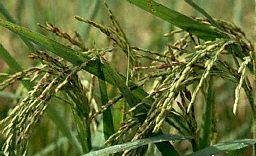The author sincerely thanks all the reporters of all news
items not only on basmati and turmeric issue but also on issues related
to Biodiveristy, Geographic Indications Act etc. Sincere thanks are
due to Dr Vandana Shiva, the leading environmentalist, whose concern
for environment and biodiversity shaped the author's thoughts although
this author differs from her on the concept of patenting.
This author sincerely thanks Dr Anuradha Moule, an expert in
Patents, for her useful inputs on Basmati related patent case and
on the philosophy of patenting in general. Figures related to Basmati
export to United States and the data on where basmati is grown are
taken from "Innovative Mechanisms for Sharing Benefits of Biodiversity
and Related Knowledge , prepared for the UNCTAD Biotrade Initiative,
by David R Downes and Sarah A Laird.
The author dedicates this article to Dr R A Mashelkar who
fervently campaigns for patent awareness in the country and exhorts
young scientists to contribute to nation building by empowering the
country to protect its traditional medicine systems, knowledge and
natural resources.
This article captures the details of the patent granted to Rice
Tec recently by USPTO, its impact on the export of Basmati to US,
the legal and scientific remedies that we ought to take to safeguard
our traditional resources and knowledge.
 On 22nd August 2001, the visiting Pakistan commerce minister
Abdul Razzak Dawood told reporters after an hour-long meeting with
his Indian counterpart Murasoli Maran that we feel strongly that Basmati
is a product of India and Pakistan and belonged to none else than
the sub-continent. Agreeing with his counterpart, Maran said "Basmati
is the queen of rice and we will not let it belong to anyone else.
"We have not lost the battle and the queen is with us", Maran said
referring to US agency giving "varietal" patent to a Texan company
on 14th August 2001 for selling its rice as a superior strain of Basmati.
On 22nd August 2001, the visiting Pakistan commerce minister
Abdul Razzak Dawood told reporters after an hour-long meeting with
his Indian counterpart Murasoli Maran that we feel strongly that Basmati
is a product of India and Pakistan and belonged to none else than
the sub-continent. Agreeing with his counterpart, Maran said "Basmati
is the queen of rice and we will not let it belong to anyone else.
"We have not lost the battle and the queen is with us", Maran said
referring to US agency giving "varietal" patent to a Texan company
on 14th August 2001 for selling its rice as a superior strain of Basmati.
On 21st August 2001, Indian Newspapers flashed the August 14 order
of US Patent Agency as headlines. The newspapers reported that the
US firm Rice Tec had earned a patent claim on Basmati in the US. It
created an uproar in the Parliament. The Parliament was informed that
"the rice strain Basmati has not become the property of an American
firm. No patent on the grain has been given to the firm nor can it
use the word `basmati' as a brand". Officials close to the Indian
defense of Basmati, however, say that the August 14 order of the US
patent office in the RiceTec case will not adversely affect India's
exports of Basmati rice to the US market. On the contrary, it is claimed
that India has been highly successful in rebuffing Rice Tec and establishing
that Basmati is a produce of the subcontinent.
Speaking on "From Global Market to Earth Democracy" on 27th August
2001 at the Indian Merchant Chambers (Ladies' wing), Founder-director
of the Research Foundation for Science, Technology and Natural Resource
Policy in Dehra Dun, Vandana Shiva asked US to stop their diseased
style of thinking and issuing patents on life forms which amounts
to biopiracy. Vandana Shiva comments that patenting is a remnant of
colonialism which basically permits a patent holder to monopolise
the production and distribution of the said product. While the Americans
conveniently expanded the horizon of patenting from synthetic molecules
to medicine and food grains, the Indian government was slumbering
until the Supreme Court shook it up to the danger of quite literally
losing the right to produce basmati rice. She alleged that even now,
the government is limiting its concern to protecting exports, not
opposing this ludicrous American patent regime. She was referring
to the patents on turmeric and basmati offered under US patent law.
What is this basmati patent about and what is the crisis associated
with it? Let us go through the various reports to assess the seriousness
of this issue and the actions that the country needs to take on a
war footing in the wake of Basmati issue.
Basmati, the
Queen amongst Rice 
There are 30,000 varieties of rice in India. India is a country synonymous
with basmati. Basmati, aromatic rice, is a thin log fragrant basmati
rice. According to the expert, the original Indian basmati grown exclusively
in the northern reaches of India is clearly superior to its imitators
in many aspects. It has an extraordinary length by breadth ratio,
making the grain long and delicate, and its fragrance is unmatched.
Even the so-called basmati 370 or Dehra Dun basmati when grown in
south India cannot match its characteristics.
Basmati has been grown in India and Pakistan for years and is one
of our traditional export items. India's basmati exports in the current
crop year (October 2000 -September 2001) are expected to be over six
lakh tones valued at about Rs 2200 crore, despite a US company getting
patents on some basmati strains, given the demand in the Gulf region,
European Union and the US. India has a captive market in Saudi Arabia
where 75 per cent of its basmati was exported. But the traders cautioned
that it is too early to gauge the impact of the development, due to
the patent awarded to the US firm. They fear that it could have long
term implications if other countries begin developing their own strains
of basmati. At this juncture India's exports were not likely to be
affected, but through legal mechanism the country must ensure that
the basmati remained within subcontinent's domain. . ....more

